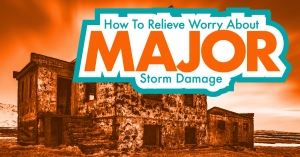Roofing storm claims can be very complex, which is why it’s best to be familiar with your insurance policy before severe weather hits your home. When you learn about a storm warning you may want to call your insurer and find out the effects of lowering or raising your deductible. Here are other essential concerns regarding roof damage from a storm and what your policy covers.
Inspect Your Roof
The first thing you should do after a storm is assess your home, roof, and yard for damage. You should avoid getting on your roof, which is best left to properly-insured roofing inspectors. Many untrained homeowners have been injured or caused more damage to their roofs by not being aware of safety or accidentally stepping on cracked shingles, creating bigger potential problems.
Simply inspect your roof visually and take pictures of any damage from the ground. Try to get shots from various angles, so the roof damage is thoroughly documented. Make sure the images are not too dark or blurry.
Make a list with details of any degraded components on your roof. If visible from the ground, check the condition of flashings, which are thin metal or plastic strips around chimneys and other protrusions. Avoid taking photos in the rain, which may not present a clear enough picture of the damages.
Contact Your Local Trusted Roofer
Next, contact a professional roof technician to answer any questions you may have before planning an inspection. Stick with a proven reputable certified roofer so you don’t end up paying much more out of your own pocket after an inexperienced handyman, who may lack the appropriate tools and skills, installs roofing materials improperly. You may be taking a big risk even with general contractors who are unfamiliar with roofing, especially if they offer no guarantee the job will be done correctly.
Working with an Atlanta-based roofer is important for reasons of convenience since they will still be around to fix future problems. Out of town storm chasers might be hard to track down after they move on to the next town that suffers a heavy storm. Be aware that Georgia does not require roofers to be licensed, which can attract short-term fly by night services run by amateurs. So exercise caution when anyone claiming to be a roofer knocks on your door after a storm to offer roof repair services, since door-to-door has been a known method for scam artists.
How to Work with Insurance
After getting a thorough inspection from a reputable roofer, the next step is to call your insurance company immediately to discuss your deductible and find out how much of the repairs will be covered by your policy. Some of the questions you should ask include:
- What is the deadline after a storm for filing a claim?
- Will my policy cover other damage to my property besides my roof?
- Will insurance pay the roofer directly when the job is complete?
- Does the age of my roof and shingles matter?
- How much does depreciation play a role in coverage?
- What if there’s damage to the attic and ceiling?
- If flashings, vents or other protrusions are damaged, does my policy cover replacements?
- What happens if I need a complete roof replacement?
- Is there any risk of my policy being canceled by filing a claim?
- What happens if my claim is rejected?
Avoid Storm Chasers
Any contractor can work with your adjuster. Don’t feel pressured by someone who knocks on your door claiming to be a roofer after a storm. Avoid signing a contract requiring you to work with the contractor, asks for upfront payment, or doesn’t provide an estimate for repair work. A reputable roofer who wants to earn your future business will ideally be present when an adjuster visits your home to assess the damages and determine a settlement amount.
No matter how well insured you are, there may still be costs not covered by your insurance, since severe storms can cause unpredictable loss. If you sign a contract which specifies the scope of work will be determined by the insurance company, you may get stuck with surprise costs your policy doesn’t cover and you won’t have any recourse.
Your local roof technician should work directly with your insurance. After you’ve spoken with your insurance company and an adjuster has visited your home, you should schedule a time for your roofer to make repairs.
Knowing what your insurance policy covers before storm damage happens to your roof will help you avoid expensive surprises. Contact us here at Echols Roofing for more information about roofing storm claims. We’re a sincere family business that’s been serving Atlanta residents since 1960 with superior and reliable roofing solutions.



